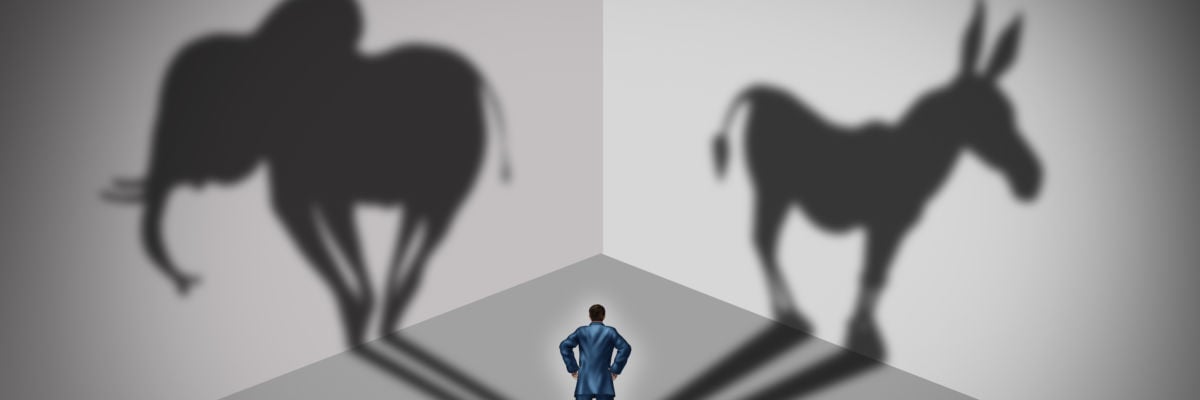
When I tell people I recently wrote a book critiquing liberal Catholicism, I sometimes get this reply: “I’m not a liberal Catholic or a conservative Catholic. I’m just a Catholic.”
Are these made-up labels to stoke controversy? Or do they track with a real division within the Church?
First, labels are just approximations of real divisions, so they will always be much broader than the nuanced opinions of people who might fall under them. But just as I can know who has a beard and who doesn’t even though I don’t know when stubble becomes a beard, I can know when some expressions of Catholicism tend to be more liberal and others tend to be conservative.
But what does that refer to?
Typically, it refers to the ongoing project of retaining the truths of the Faith handed on in the past while adapting them to new and ever-changing circumstances.
On the very, very far left, you would have people who say there is nothing essential to be handed on. They might even deny fundamental elements of the Creed. Indeed, theological liberalism reached its heyday in the early twentieth century, when, in reaction to the work of German higher form criticism, it tried to “modernize” the Christian faith by rejecting doctrines like the Virgin Birth.
Similar controversies in the nineteenth century arose in the Catholic world, with scholars questioning doctrines like papal infallibility (prompting that doctrine’s reaffirmation at Vatican I), the miracle accounts of the Bible, and even foundational teachings like the deity of Christ. One prominent French scholar referred to Jesus as un homme incomparable—an incomparable man, but a man nonetheless. Pope Pius X called this primacy of modern sentiments over divine revelation “the synthesis of all heresies” (Pascendi Dominici Gregis 39).
More conservative Protestants famously countered this liberal movement through the publication of a series of essays called The Fundamentals: A Testimony to the Truth, which became the background for later Protestant “fundamentalist” movements. That’s where one can fall into the other extreme, such as by saying that acceptance of the theory of evolution (or, for some people, even heliocentrism) means that we have entirely abandoned the Faith.
So the far left, who say “anything is up for grabs,” and the far right, who say “nothing can ever change,” are the bounds of the theological spectrum, and everyone else falls somewhere on it. I find that “liberal Catholics” tend to fall toward the end that is more open to the idea that fundamental Church teaching can change to incorporate modern ideas—particularly regarding life and human sexuality—even if they don’t come right out and say it.
It could be a Catholic author who says the faithful must support certain policies related to climate change, gun control, or affirmative action. Or maybe it’s a Catholic author who says Catholics would really respect women by not outlawing abortion. Or maybe it’s a well-known Catholic priest who says it’s okay to have “gay pride.” These public figures don’t outright say, “The Church is wrong on abortion and homosexuality,” but they do something worse . . . their actions sow seeds of doubt that cause some people to reject the Church’s teachings in the name of liberal values like “inclusivity.”
I don’t want to spend time arguing about matters Catholics are free to disagree about, especially since Scripture condemns this kind of quarreling and infighting. St. Paul said, “Why do you pass judgment on your brother? Or you, why do you despise your brother? For we shall all stand before the judgment seat of God. . . . Let us then pursue what makes for peace and for mutual upbuilding” (Rom. 14:10, 19).
But sometimes fellow believers can confuse the faithful, and when this happens, they must be corrected.
Paul makes this point at the end of his letter to the Romans: “Take note of those who create dissensions and difficulties, in opposition to the doctrine which you have been taught; avoid them. For such persons do not serve our Lord Christ, but their own appetites, and by fair and flattering words they deceive the hearts of the simple-minded” (16:19-21). He also encourages St. Timothy to “convince, rebuke, and exhort, be unfailing in patience and in teaching. For the time is coming when people will not endure sound teaching, but having itching ears they will accumulate for themselves teachers to suit their own likings” (2 Tim. 4:2-3).
Some people may say I’m being divisive for calling certain people “liberal” or “conservative.” But I would point them to Catholics who voluntarily choose these labels. For example, Michael Sean Winters of the National Catholic Reporter says, “We liberal Catholics never went away and never could go away.” And Reporter executive editor Heidi Schlumpf gives this description of the liberal (or, as she says, “progressive”) Catholic:
They are the gray-haired old-timers at church reform organizations and parishes. They are the young Catholics taking their first theology course at a Catholic college or university—and the theologians teaching those classes. They are the retired priests, sisters, and even some bishops who have spent their lives working for social justice. They are Women’s March marchers, Green New Deal supporters, and Black Lives Matter protesters across generations.
So yes, there are “liberal” Catholics and “conservative” Catholics.
Of course, we all, liberal or conservative, are “Catholic”—provided that we assent to the teachings of the Church. One can be a faithful Catholic and hold imprudent theological or political positions, be they liberal or conservative. That’s why we must always be on guard against errors and ambiguities that can put us in danger of falling off the barque of Peter, whether it’s off the “left” or the “right” side.



